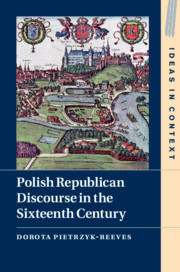Description
Polish Republican Discourse in the Sixteenth Century
Ideas in Context Series
Author: Pietrzyk-Reeves Dorota
A landmark study of republican discourse in sixteenth-century Poland-Lithuania and its original contribution to early modern republicanism.
Language: English
Subject for Polish Republican Discourse in the Sixteenth Century:
Approximative price 107.80 €
In Print (Delivery period: 14 days).
Add to cart
Publication date: 04-2020
292 p. · 15.8x23.5 cm · Hardback
292 p. · 15.8x23.5 cm · Hardback
Description
/li>Contents
/li>Biography
/li>
Exploring republican ideas and concepts that developed in sixteenth-century Poland under the impact of humanism and the Renaissance, as well as political and constitutional changes, this is a landmark study of republican discourse in sixteenth-century Poland-Lithuania. It provides a conceptual and contextual analysis of the rich political literature and debate which animated intellectual life and political reasoning during the Polish-Lithuanian Commonwealth, and effectively demonstrates its republican character. Using a comparative perspective, Dorota Pietrzyk-Reeves situates the Polish republican discourse within both the classical and early modern republican traditions, bringing together contexts and ideas that have traditionally been overlooked by scholars of early modern Europe. In addition, she also underlines the originality of Polish concepts such as the relationship between law, liberty and virtue as key elements of a well-ordered commonwealth and the vision of a mixed res publica that had a monarchical character. This book is an invaluable resource for anyone interested in European intellectual history and the early modern republican tradition.
Introduction: classical republican tradition and the Polish republican discourse; 1. Polish sixteenth-century political thought in context; 1.1 The fifteenth-century origins of Polish humanism and political thought; 1.2 The political and constitutional background; 1.3 Specific features of sixteenth-century Polish political thought; 2. The commonwealth (res publica): a free political community; 2.1 The commonwealth (res publica) and the concept of political order; 2.2 Justice and law; 2.3 The paradigm of liberty; 3. Virtue and the common good; 3.1 Moral foundations of good order; 3.2 Virtue and the public good; 3.3 Citizenship and duties to the commonwealth; 3.4 Manners, education, emendation; 4. Mixed constitution and the institutional foundations of the commonwealth; 4.1 Introduction; 4.2 The sources of power and the principle of supreme authority; 4.3 The mixed form of government and the monarchia mixta; 4.4 The king, senators, and parliamentary envoys; 4.5 Free election; Epilogue.
Dorota Pietrzyk-Reeves is Associate Professor of Political Philosophy at the Jagiellonian University, Krakow. Her major publications focus on normative political theory and include The Idea of a Civil Society: Contemporary Debate and its Sources (2004, 2012), Questions of Contemporary Political Philosophy (2007), An Identity of the Old Continent and the Future of the European Project (2007) and Civil Society, Democracy and Democratization (2016).
© 2024 LAVOISIER S.A.S.




